
The Castro Theatre is a historic movie palace in the Castro District of San Francisco, California. The venue became San Francisco Historic Landmark #100 in September 1976. Located at 429 Castro Street, it was built in 1922 with a California Churrigueresque façade that pays homage—in its great arched central window surmounted by a scrolling pediment framing a niche—to the basilica of Mission Dolores nearby. Its designer, Timothy L. Pflueger, also designed Oakland's Paramount Theater and other movie theaters in California during that period. The theater has over 1,400 seats. The theater's ceiling is the last known leatherette ceiling in the United States and possibly the world. Another leatherette ceiling was demolished just a few years ago. To make the ceiling look as though it is leather requires a special technique regarded as lost today.

A theatre organ is a type of pipe organ developed to accompany silent films, from the 1900s to the 1920s.
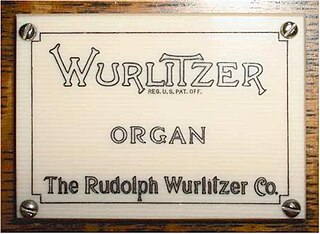
The Rudolph Wurlitzer Company, usually referred to as simply Wurlitzer, is an American company started in Cincinnati in 1853 by German immigrant (Franz) Rudolph Wurlitzer. The company initially imported stringed, woodwind and brass instruments from Germany for resale in the United States. Wurlitzer enjoyed initial success, largely due to defense contracts to provide musical instruments to the U.S. military. In 1880, the company began manufacturing pianos and eventually relocated to North Tonawanda, New York. It quickly expanded to make band organs, orchestrions, player pianos and pipe or theatre organs popular in theatres during the days of silent movies.

The Fox Theatre, a former movie palace, is a performing arts center located at 527 N. Grand Blvd. in St. Louis, Missouri, United States. Also known as "The Fabulous Fox", it is situated in the arts district of the Grand Center area in Midtown St. Louis, one block north of Saint Louis University. It opened in 1929 and was completely restored in 1982.

The Bay Theatre is a single-screen movie theater in Seal Beach, California, United States. It is best known for its screenings of foreign and independent films, and for its revival screenings. The Bay Theatre is also home to a Wurlitzer organ, which is used for concerts and silent film screenings.
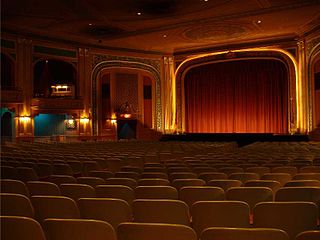
The Lafayette Theatre is a nationally acclaimed movie palace located in downtown Suffern, New York, built in 1923. Its primary function is first-run movies, but it also houses special events like its popular weekly Big Screen Classics film shows. It is also notable for housing a Wurlitzer theatre organ, which is played before Big Screen Classics shows.
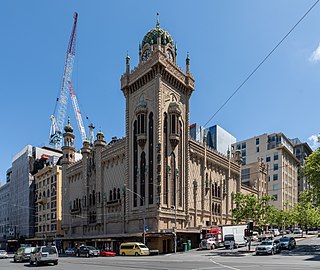
The Forum Theatre is a historic theatre and former cinema now used as a live music and event venue located on the corner of Flinders Street and Russell Street in Melbourne, Australia.
George Wright was an American musician, possibly the most famous virtuoso of the theatre organ of the modern era.
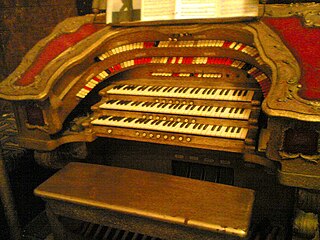
The Bartola Musical Instrument Company of Oshkosh, Wisconsin, USA, was a producer of theater pipe organs during the age of silent movies.

The Paramount Theatre is a concert venue in Denver, Colorado, located on Glenarm Place, near Denver's famous 16th Street Mall. The venue has a seating capacity of 1,870 but is a popular destination for large acts looking for a smaller concert setting. With spelling as Paramount Theater, the building was listed on the National Register of Historic Places in 1980.

The Riviera Theatre is a historic, 1140 seat entertainment venue in North Tonawanda, New York. The theatre hosts a multitude of performing arts events per year, including live concerts, theatre, dance shows, and movies. The Riviera's “Mighty Wurlitzer” theatre organ has been fully restored, is continually maintained by volunteers, and is famed as being one of two original Wurlitzer demonstrator organs, which the company would use to show off to potential clients in the height of the silent film era.

The Robert Morton Organ Company was an American producer of theater pipe organs and church organs, located in Van Nuys, California. Robert Morton was the number two volume producer of theatre organs, building approximately half as many organs as the industry leader Wurlitzer. The name Robert Morton was derived not from any person in the company, but rather from the name of company president Harold J. Werner's son, Robert Morton Werner.

Bernie Anderson Jr. is a silent film music composer, organist and orchestrator. He has presented live accompaniments for silent films, with theatre organ and piano since 1995. He is also active in the preservation and restoration of Movie Palaces, Theatre organs and Classic Film.

Troxy is a Grade II-listed Art Deco music venue on Commercial Road in Stepney, London. Built as a cinema in 1933, it closed in 1960 and became a training school for the London Opera Centre. In the 1980s the building was used as a bingo hall, and the Troxy was converted to a live events space in 2006. The building is considered a vital part of East London's history and was Grade II listed in 1990. It has a capacity of 3,100.

A number of Wurlitzer theatre organs were imported and installed in the United Kingdom in the period from 1925 to just before the Second World War (1939–45).
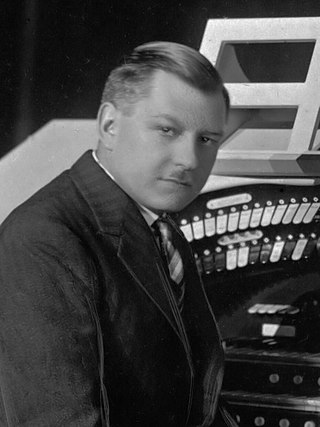
Reginald John Foort, FRCO, ARCM, was a cinema organist and theatre organist. He was the first official BBC Staff Theatre Organist from 1936 to 1938, during which time he made 405 broadcasts on the organ at St George's Hall, Langham Place. 'Reggie' was a hugely popular broadcaster in his heyday in the late 1930s and 1940s in Britain and later settled in the United States, where he similarly enjoyed an illustrious career performing and recording.

The Odeon Cinema, Manchester was a former Odeon Cinema located on Oxford Street, Manchester, England. It was close to St. Peter's Square, within the Civic Quarter of Manchester city centre. It was demolished in April 2017, and replaced by Landmark, a 14-storey office building, as part of a major transformation of the area.
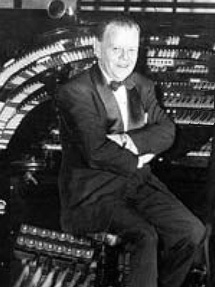
Richard William "Dick" Leibert was an American musician who was the chief organist at New York City's Radio City Music Hall between 1932 and 1971. He also had a radio program of organ music on the NBC Radio Network in the 1930s and 1940s, along with making phonograph recordings on the RCA Victor and Westminster Records labels.

The Senate Theater is a theater in Detroit, Michigan, known for its "Mighty Wurlitzer" pipe organ, originally installed at the Fisher Theater. The Senate opened in 1926, deteriorated substantially after its closure in the 1950s, and reopened in 1964 under the ownership and volunteer operation of the Detroit Theatre Organ Society. The Senate continues to present organ performances, classic films, and private events.





















